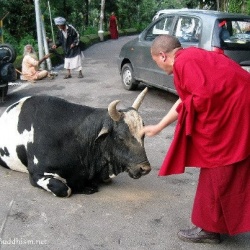Upekkha
Jump to navigation
Jump to search
Upekkhā (in devanagari: ऊपेक्खा), is the Buddhist concept of equanimity. As one of the Brahma Vihara (meditative states), it is a pure mental state cultivated on the Buddhist path to nirvāna.
Pali literary contexts
In the Pali Canon and post-canonical commentary, upekkha is identified as an important step in one's spiritual development in a number of places:
- It is one of the Four Sublime States (brahmavihara), which are purifying mental states capable of counteracting the defilements of lust, avarice and ignorance. As a brahmavihara, it is also one of the forty traditionally identified subjects of Buddhist meditation (kammatthana).
- In the development of meditative concentration, upekkha arises as the quintessential factor of material absorption, present in the third and fourth jhana states.
- In the Seven Factors of Enlightenment (bojjhanga), upekkha is the ultimate factor to be developed.
- In the Theravada list of ten paramita (perfections), upekkha is the last-identified bodhisatta practice.
Similarity with non-Buddhist Concepts
Ataraxia and Apatheia are similar terms in Greek philosophy.
Contemporary exposition
American Buddhist monk Bhikkhu Bodhi wrote:
- “The real meaning of upekkha is equanimity, not indifference in the sense of unconcern for others. As a spiritual virtue, upekkha means stability in the face of the fluctuations of worldly fortune. It is evenness of mind, unshakeable freedom of mind, a state of inner equipoise that cannot be upset by gain and loss, honor and dishonor, praise and blame, pleasure and pain. Upekkha is freedom from all points of self-reference; it is indifference only to the demands of the ego-self with its craving for pleasure and position, not to the well-being of one's fellow human beings. True equanimity is the pinnacle of the four social attitudes that the Buddhist texts call the 'divine abodes': boundless loving-kindness, compassion, altruistic joy, and equanimity. The last does not override and negate the preceding three, but perfects and consummates them.”
